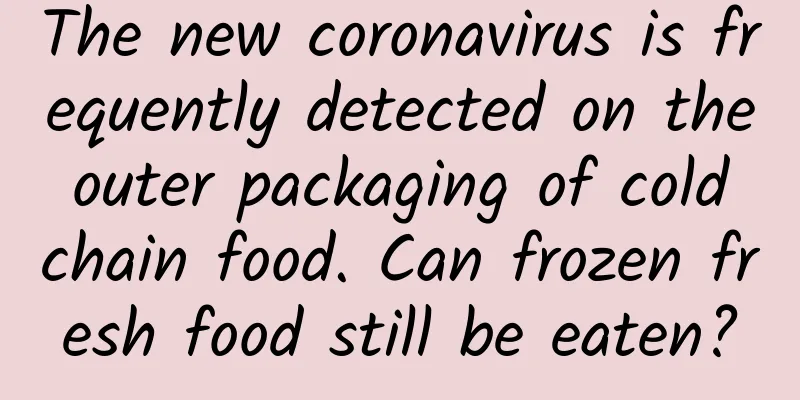The new coronavirus is frequently detected on the outer packaging of cold chain food. Can frozen fresh food still be eaten?

|
The coronavirus has been frequently detected on the outer packaging of cold chain food. It has been confirmed that the coronavirus can be transmitted from objects to humans and can survive for a long time when frozen. This has caused people to worry that the virus may be transmitted through food and cause a new outbreak. Can frozen fresh products, especially imported frozen fresh products, still be eaten? In response, the Chinese Center for Disease Control and Prevention stated that the risk of infection for the general public who come into contact with or eat cold chain food is very low. Existing research and prevention and control practices have shown that COVID-19 is not a foodborne disease, and no cases of infection through ingestion of food have been found. The risk of infection for consumers is extremely low. Relevant departments in my country have stepped up measures to monitor and disinfect imported cold chain foods for COVID-19. The general public should keep them clean and separate raw and cooked food, and can buy and eat imported fresh food as usual. However, they should pay attention to every detail when purchasing, cleaning, processing and cooking. So how should ordinary people choose and eat frozen fresh products? Let the experts give you some advice. When purchasing Go to regular supermarkets or markets to buy fresh products. When shopping, you can use disposable plastic bags to cover your hands to select frozen and chilled foods to avoid direct contact with your hands. At the same time, wear a mask correctly. When buying pre-packaged frozen and chilled foods, pay attention to the production date, shelf life, storage conditions and other food label information to ensure that the food is within the shelf life. Wash your hands with soap or hand sanitizer in time after shopping. Before washing your hands, do not touch your mouth, nose, eyes and other parts with your hands. When shopping overseas or purchasing goods from foreign countries or regions, including purchasing frozen foods from abroad, pay attention to customs food quarantine information and disinfect the outer packaging. During cleaning Keep the kitchen and utensils clean and hygienic, and wash your hands before handling food. Separate raw and cooked food. Containers (basins), knives, cutting boards and other utensils used to handle frozen and chilled food should be placed separately. They should be cleaned and disinfected in time to avoid mixing with utensils used to handle food that is eaten directly to avoid cross contamination. Frozen and chilled food should be stored in the freezer of the refrigerator. Do not store it for too long and store it in layers with cooked food. Wash your hands before touching cooked food after washing or touching frozen and chilled food. In addition, the kitchen should be kept ventilated and clean, and the environment and tableware and cooking utensils should be disinfected when necessary. When cooking or eating When cooking and eating frozen and chilled food, it should be cooked thoroughly. The general principle of cooking thoroughly is to keep the water boiling for 10 to 15 minutes. Be careful to avoid eating seafood raw, half-cooked, soaked in wine, vinegar or salt. When two or more people dine together, remember to use serving chopsticks and spoons to reduce cross-infection and reduce the incidence of infectious and foodborne diseases. Please store uneaten (already cooked) seafood in the refrigerator and eat it as soon as possible. Be sure to fully heat it before eating it again, and the core temperature must reach above 70°C. After cooking, clean and disinfect countertops, containers, kitchen utensils, etc. We need to remind everyone that if you develop fever or diarrhea symptoms after eating frozen or chilled food, you should go to the fever clinic for medical treatment in time, and actively provide information such as the time of consumption, type of food, and source of ingredients to assist in diagnosis and treatment. Popular Science in China: Talks from Masters at the Frontier of Science and Technology China Internet Joint Rumor Refutation Platform Xinhuanet Science Department Co-production |
<<: Cancer Myths Quick Check Guide - Cancer Prevention
>>: Correctly understand depression and avoid these misunderstandings!
Recommend
Lochia has a smell
The reason why lochia has a smell is because the ...
Itchy hairy area on female genitals
It is very common for women to experience itching...
What are the fetal development indicators during pregnancy?
Every child is the most precious treasure in the ...
Treatment of elevated thyroid hormone levels during pregnancy
High thyroid hormones during pregnancy have a gre...
What causes pain on both sides of the uterus?
Uterine pain is a symptom that many women have ex...
Causes of red bumps on the vulva
As the pace of life accelerates nowadays, it seem...
My girlfriend wanted to vomit after sex
I had sex a few days ago and the time was too sho...
Is it okay to eat hot dry noodles for gastric ulcer? What causes gastric ulcer?
Gastric ulcer is a common stomach disease, which ...
The main reason why pregnant women's tongue turns black
Many friends who are pregnant will find that the ...
How to identify stroke early? Remember the motto "BE FAST"
What is a stroke? Cerebral apoplexy, commonly kno...
What is the most effective way to treat uterine cold?
Uterine cold is a disease with a very high incide...
Things to note after mastectomy
The breast needs to be removed if it has some ser...
False labor is more likely to occur when lying down
After a woman becomes pregnant, her body will exp...
How to eat black sesame paste to improve hair quality? Is black sesame paste easy to digest?
In daily life, black sesame paste is a favorite f...
How to improve women's immunity
In today's society, female friends are often ...









